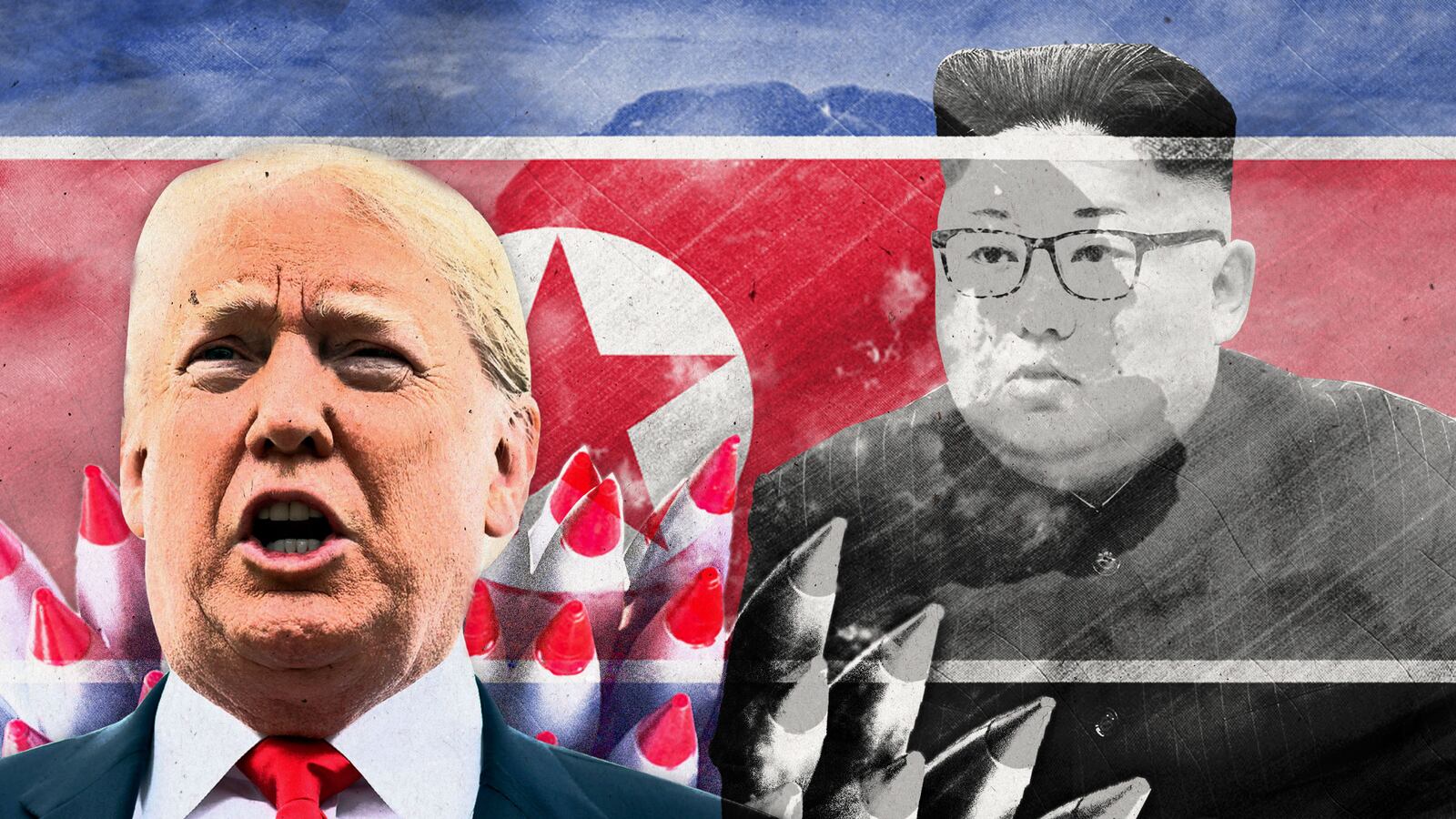LONDON — Remember North Korea? Remember those nukes and missiles it has that could threaten the American heartland? Remember those hostage remains of U.S. soldiers killed more than 75 years ago? Which is to say: Remember all those problems Donald Trump announced were solved after his June 12 summit with Kim Jong Un in Singapore?
Probably you do remember, but at this point Trump might prefer that you forget, because the negotiations are not going well at all. Even the discussion of when and how to return 200 sets of remains — which Trump held up as a brilliant addition he made at the last minute to his one-page accord with Kim, and which Trump then claimed was a done deal — is not a deal that has been done at all.
The hallucinatory Trump summit with Vladimir Putin in Helsinki last week diverted attention from Korean issues, but they look as intractable as they ever did, raising profound questions about what Trump gives away to get what he claims are triumphs of statecraft. He goes into these encounters unprepared, comes out looking like he’s been played for a sucker, then tries to compensate with bluster and bullying. The Washington Post reports that, privately, Trump is fuming.
One of Trump’s tweets on Friday certainly suggests he’s getting more than a little defensive as his inadequacies become evident. He claimed the “Fake News Media” were just “hypocrites” refusing to recognize his capital-D “Diplomacy.”
The Daily Beast has watched the issue of the GI remains in North Korea closely because in the great scheme of statecraft things it ought to be an issue infinitely easier to resolve than the so-called “denuclearization” of North Korea, but it reflects enormously on Trump. In each encounter, thus far, he has lost face.
An anonymous U.S. official told Stars and Stripes earlier this week that the North Koreans will be transferring 55 sets of remains across the North-South line at the truce village of Panmunjom maybe by next Friday, July 27, the 65th anniversary of the signing of the armistice at Panmunjom that ended the Korean War. But silence reigns on when or whether they’ll turn over the remaining 145 of 200 sets that originally were promised, or are ready to cooperate in searching for more. In any case they represent a tiny percentage of what’s left of 5,300 American soldiers, marines and airmen “missing in action” from the Korean War.
Trump, after Singapore, said the goals set there would be realized “very quickly.” On Tuesday, he told reporters, “We have no time limit. We have no speed limit.”
That comment amounts to an admission that Secretary of State Mike Pompeo got nowhere following up in Pyongyang on the vague promise of “denuclearization” that Trump and Kim signed at Singapore. Nor will the North Koreans be impressed by Pompeo’s latest plea at the United Nations for Kim to “do what he promised the world he would do” — that is, denuclearize. And it is inconceivable the North Koreans will respond favorably to his charge that they’ve been importing oil via ship-to-ship transfers “at a level that far exceeds the quotas” under U.N. sanctions.
The Americans apparently continue to expect the North Koreans to honor, gradually, the fourth and last point of the Trump-Kim statement: the commitment to return the remains they’ve got, look for more and repatriate them to the U.S. in an extended exercise that would seem to have nothing to do with de-nuking. Except that it does.
“They [the North Koreans] see everything from the viewpoint of leverage,” said Kim Tae-woo, former director of the Korea Institute for Defense Analyses. It was the North Koreans, he said, who called for the first meeting in nine years between an American and a North Korean general at Panmunjom to talk about the remains. “They strongly demanded the generals’ meeting in Panmunjom. They are trying to use that meeting to push a Declaration of the End of the Korean War. The return of remains gives them some leverage.” In the meantime, he notes, “We have seen nothing about a timetable” for denuclearization.
The North Korean push for a “peace declaration” in place of the truce that ended the Korean War is believed to explain the delay in turning over at least some of the bones.
The North Koreans are expected to make the most of the anniversary of the signing of the truce, hoping to deepen a fissure between the U.S. and South Korea’s President Moon Jae-in, who has also called for a statement that might lead to a peace treaty. The Americans don’t express their disagreement openly with Moon but are wary of any agreement that might encourage demands for withdrawal of the 28,500 U.S. troops now in South Korea.
Moon has said he wants U.S. troops to stay, precipitating his own problems with the North. After Moon, on a post-summit visit to Singapore, called for the U.S. and North Korea to carry out whatever their leaders had agreed on, the North’s party newspaper Rodong Sinmun, without mentioning “complete denuclearization,” scolded him for being “rude.”
The North Koreans would no doubt be less happy about South Korea’s foreign minister, Kang Kyung-wha, seeing Pompeo in New York, expressing confidence that “the process to repatriate the remains of American soldiers has begun,” while promising to hold the North to their “clear commitment” on denuclearization.
The North Koreans are sure to request large sums in “expenses” for searching for remains, as they did during joint recovery operations that went on for 11 years until 2005 when George W. Bush, then president, stopped them. The fear then was the security of Americans as North Korean rhetoric grew increasingly vitriolic in the run-up to the North’s first nuclear test in 2006.
In “the new era” proclaimed in Singapore, the concerns are part of a bigger picture. “The North Koreans are using this as a tool to drag things out,” says Bruce Bechtol, a former Defense Intelligence Agency analyst and author of numerous books and studies on North Korean military issues. “Their main goal is to get as many concessions as possible.”
Mark Fitzpatrick, a former U.S. diplomat now with the International Institute for Strategic Studies, lists the North’s priorities in order of importance. “Resuming joint recovery operations will mean a source of revenue for North Korea,” he believes, “but more importantly, they see value in engagement with the U.S. at various levels in hopes of initiating peace treaty talks.”
Many years after they died in obscure battlegrounds, the soldiers’ remains are pawns in a cynical bargaining game that Trump seems never to have imagined in Singapore and refuses to acknowledge now.







